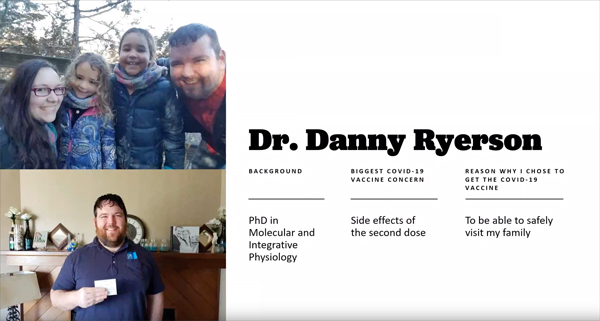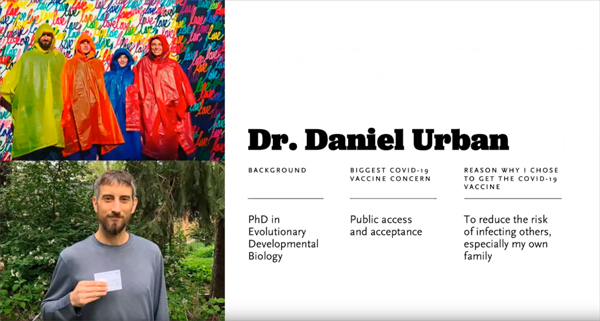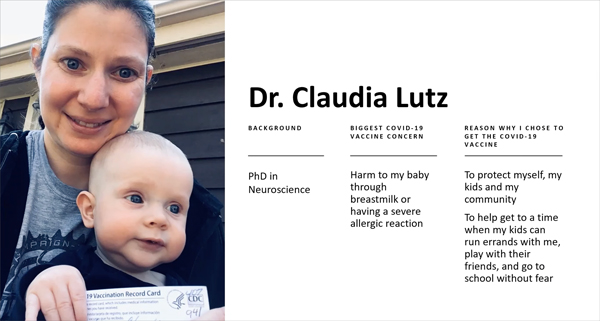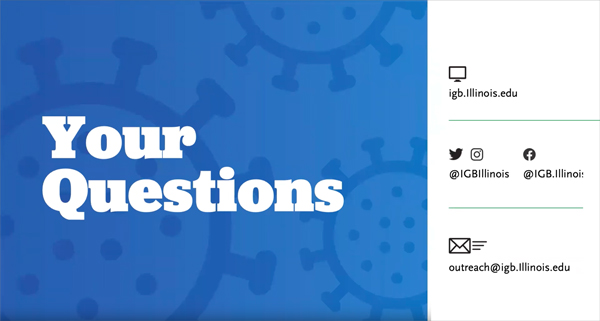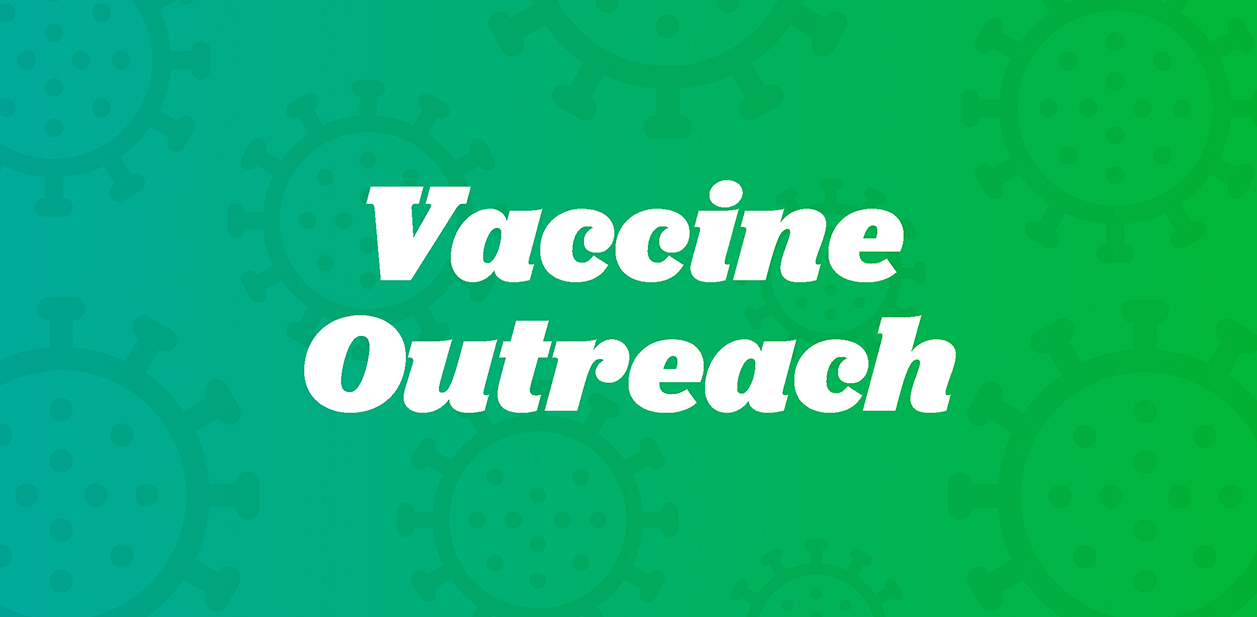
The outreach and communications group at the IGB collated different types of resources to help you learn about the COVID-19 vaccines. We continue to make these resources available to anyone who may wish to refer back to this space to address curiosity, questions, or concerns.
Common Concerns
Not sure whether you should get the COVID vaccine? Are you concerned that the vaccines were developed too quickly and you want to wait to get your shot? It's ok to be concerned about the safety and efficacy of the vaccines. To help you make your decision, we have read through the scientific literature and have addressed all the FAQs below.
- I’m worried that vaccines will impact my fertility.
-
- Research has found no effect of the vaccine on male or female fertility.
- 123,000+ pregnant people have been vaccinated.
- A study in the New England Journal of Medicine showed that out of 35,691 pregnant people, 30,887 received the vaccine while pregnant and 4,804 became pregnant after vaccination. Additionally, 827 vaccine participants gave birth successfully and the rate of pregnancy complications was the same as pre-COVID averages.
- Where did the rumors start from? A vaccine skeptic incorrectly claimed similarity between the spike protein of COVID and the syncytin-1 protein in the placenta. However, the level of genetic overlap is miniscule, like the chance of misdialing between phone numbers that only have a single digit in common.
- Researchers are interested in learning whether an altered episode of menstruation is a possible response to vaccination; many things, including a flu, cold, stress or exercise can temporarily change menstruation but do not harm fertility.
- COVID-19 is dangerous for pregnant people and the pregnancy itself, so it is important for those who are pregnant or considering pregnancy to be well protected.
Sources:
cdc.gov | nejm.org | mayoclinic.org - I’m scared that I will have an allergic reaction to the vaccine.
-
- Cases of anaphylaxis (acute allergic reactions) are rare: approximately 2.5-11 cases per million doses, depending on the vaccine. They occur in the first fifteen minutes and vaccine clinics are equipped to deal with them, which is why you are instructed to wait at the vaccination site after you get your shot.
- The majority of recipients experience no side effects.
- If there are any effects, they include soreness at the injection site, headache, and fever and/or chills lasting no more than two days.
- The chances of getting blood clots from the Johnson and Johnson vaccine is 1 in 1,000,000. For comparison, the chances of getting a blood clot is 1 in 5 in hospitalized COVID patients, 1 in 100 in smokers, and 1 in 3000 for oral contraceptives.
Sources:
jamanetwork.com | thelancet.com | nejm.org - Vaccine rumors
-
A new vaccine can be scary! People like to talk about frightening things they have heard to see what others think. For example, you may have heard people say that covid vaccines change your DNA, make you shed virus, affect your fertility, or harm your overall health. These rumors about the covid vaccines are not true, and you can help others by knowing the facts.
- There is no scientific evidence that the vaccine contains microchips or makes people magnetic.
- The rumors about COVID vaccines are not true, and you can help others by reassuring them.
- Only the antibodies generated after vaccination can be passed through breast milk, not the virus. Studies suggest it could be good protection that would last as long as the antibody-laden milk is consumed.
- The antibodies generated from natural immunity do not last as long as the antibodies from the vaccine. Everyone needs to get vaccinated, even if they’ve gotten COVID.
- The vaccines cannot enter the nucleus, where your DNA is.
- Since the vaccines do not contain COVID virus, getting the vaccine cannot cause people to shed virus or become infected with covid.
Sources:
theatlantic.com | cdc.gov | bmj.com | ajog.org | covid-101.org - I have questions about how the covid vaccines were tested.
-
- Researchers have been studying mRNA vaccines (like Moderna and Pfizer) and adenovirus vaccines (like Johnson & Johnson) for decades, including vaccines for flu and rabies.
- The vaccines have been held to the same rigorous safety standards as all the other types of vaccines in the U.S.
- The large number of clinical trial volunteers and the fast spread of COVID at the height of the pandemic allowed much faster data collection compared to other vaccines.
- 306 million doses have been administered in the U.S. and 142 million people are fully vaccinated (43.1%) with only rare and treatable side effects reported.
Sources:
nature.com | wikipedia.org | cdc.gov - I’m worried that the vaccine will make me sick or give me COVID.
-
- The vaccines teach our immune systems how to recognize and fight the COVID-19 virus.
- None of the vaccines in the U.S. contain the COVID-19 virus, so the vaccine cannot give you the disease.
- The majority of recipients experience no side effects.
- If there are any effects, they include soreness at the injection site, headache, and fever and/or chills lasting no more than two days.
Sources:
doh.wa.gov | cdc.gov | thelancet.com - I’m concerned about the vaccine ingredients.
-
- The ingredients of the Moderna vaccine are also found in table sugar, potato chips, pickled vegetables, grilled foods, pharmaceuticals, meat, and food coloring.
- The ingredients of the Pfizer vaccine are also found in vegetables, table salt, puddings, chocolate, cheese, red meat, and food additives.
- The ingredients of the Johnson and Johnson vaccine are also found in citrus fruits, ice cream, alcoholic beverages, table salt, food additives, and corn syrup.
Sources:
cdc.gov - I don’t want to get a vaccine if it’s not safe for someone like me.
-
From the data taken from 86,967,420 fully vaccinated people:
- 11,664,320 are Hispanic/Latino.
- 821,034 are American Indian/Alaska Native.
- 5,258,910 are Asian.
- 7,537,560 are Black.
- 241,498 are Native Hawaiian/Other Pacific Islander.
- 6,918,513 identified as “Other, Non-Hispanic."
Sources:
covid.cdc.gov - I already have health concerns and I’m worried the vaccine will make me sick.
-
- 349 million doses have been administered in the U.S. and 166 million people are fully vaccinated (50.5% of the population) (data taken on August 6, 2021).
- So far, underlying medical conditions/medications do not seem to be affected by the vaccine.
- Those who take medications that suppress the immune system need to speak to their healthcare providers about the effectiveness of getting the vaccine.
- What happens if my kids or I don’t get vaccinated?
-
- At least 70-85% of the U.S. population needs to be immunized to reach herd immunity (fully block the spread of COVID-19).
- Not everyone can get a vaccine, for example chemotherapy patients and newborns, and they depend on herd immunity.
- The more people who choose not to take the vaccine, the more COVID-19 can continue to spread and change, making lockdowns and the necessity for booster shots more likely.
- Although children often experience milder disease than adults, they can still experience chronic symptoms, become severely ill, or die. Our children rely on us for protection from disease.
- I don’t want to bother with the shot if I’m just going to need a booster later anyway.
-
- A booster is not currently required.
- However, given the number of variants, people may need annual vaccinations, like for the seasonal flu, or boosters every few years to renew immunity, like for tetanus.
- The faster people get vaccinated now, the less likely it is that variants will make a booster necessary soon.
- To design a booster shot, we need to know how long the vaccine antibodies last and how much COVID-19 mutates; researchers are currently studying this and developing boosters to be prepared.
Vaccine Ingredients
The components of the Pfizer-BioNTech, Moderna, and Johnson & Johnson are all found in our daily lives! Scroll through the different ingredient cards to find out more.
- Pfizer
-
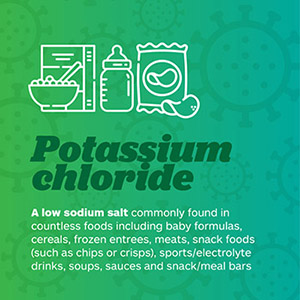
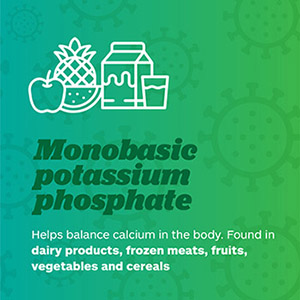
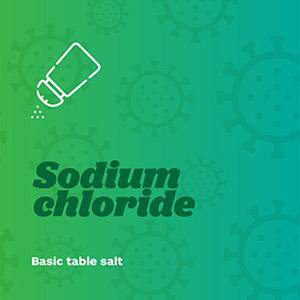
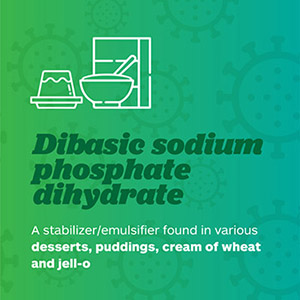
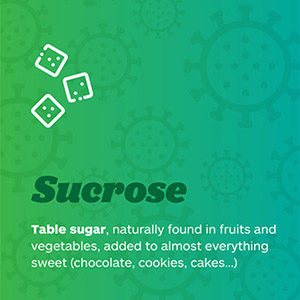
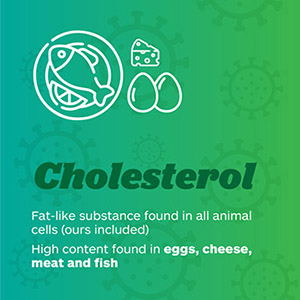
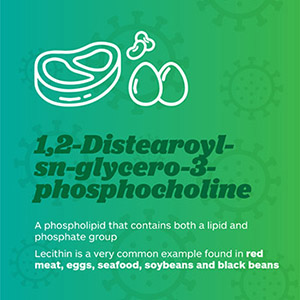

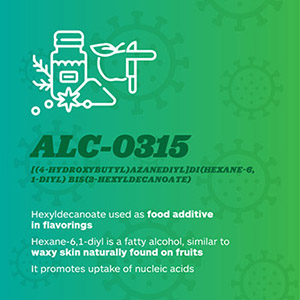
- Moderna
-
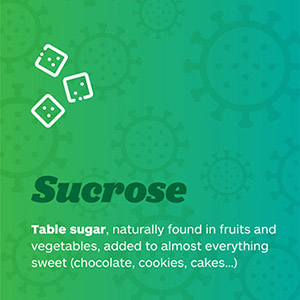
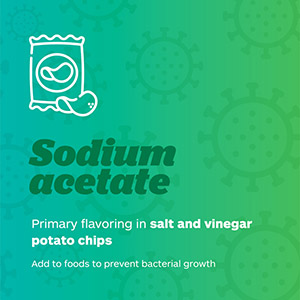
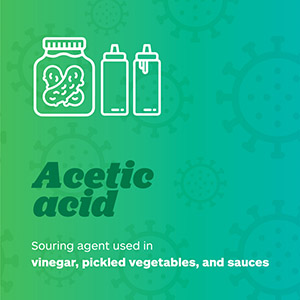
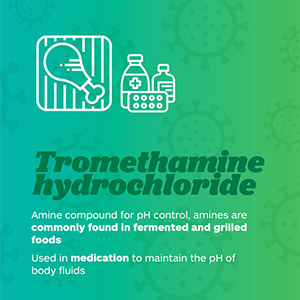
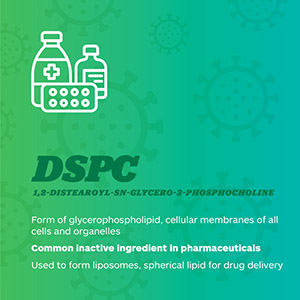
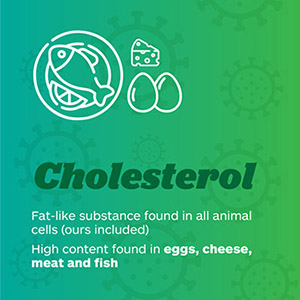
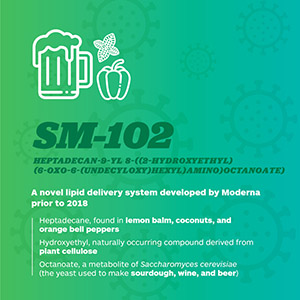
- Johnson & Johnson
-
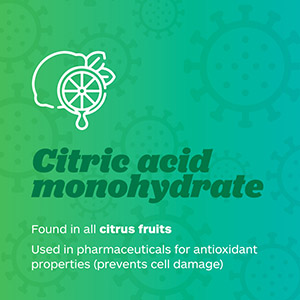
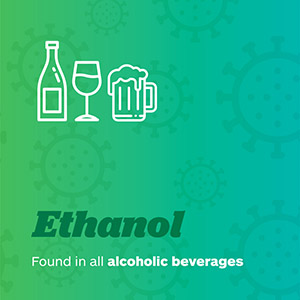
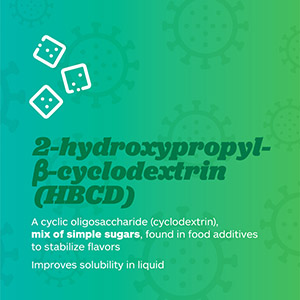
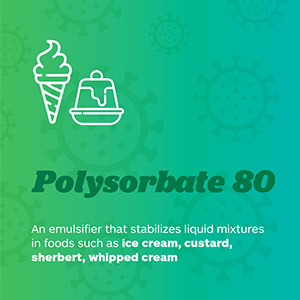
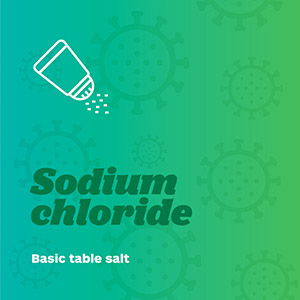
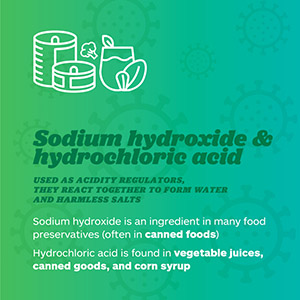
Videos
In our "Ask A Scientist: COVID Q&A" YouTube series, we featured scientists from the IGB who have studied the research findings on COVID-19 vaccines. If you would like us to give a presentation on these topics, please feel free to contact us at outreach@igb.illinois.edu.
- Vaccine benefits
-
Do the COVID vaccines really help? Can I delay getting them? Do I need to get a vaccine even if I have gotten COVID? In this episode of "Ask a Scientist: COVID Q&A" Dr. Danny Ryerson answers these questions to help us understand the importance of getting vaccinated.
- Vaccination risks
-
Are the COVID vaccines safe? What are the possible side effects? In this episode of "Ask a Scientist: COVID Q&A" Dr. Daniel Urban answers these questions to provide perspective on the safety of vaccines compared to the risks of COVID.
- Vaccines and fertility
-
Will the COVID vaccines affect my pregnancy? Will they harm my baby if I breastfeed? In this episode of "Ask a Scientist: COVID Q&A" Dr. Claudia Lutz explains what the studies show about COVID vaccines with respect to fertility, menstruation, and pregnancy.
- Common questions
-
Is COVID really worse than the flu? Is the pandemic over yet? How do the COVID variants affect us? In this episode of "Ask a Scientist: COVID Q&A" Dr. Daniel Urban answers these questions to help us decide what precautions we might still need to take.
Discovery Kits
The kits are designed to teach children of ages 8 and above how vaccines are made and distributed. They will be guided through the activities by Dr. Skeld, a scientist from the Polusville Center for Disease Control, who needs help finding a vaccine for a new disease called Severe Unicorn Syndrome (SUS). The activities include sorting through scientific data and solving different types of puzzles. The materials can also be found at the public libraries in Champaign and Urbana.
- Discovery Kit #1: Introduction to vaccines
- Discovery Kit #2: Vaccine development
-
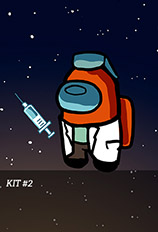
Dr. Skeld needs you to help him with Phase 1 of SUS vaccine development. Nine companies have sent the information on their vaccines but you need to find the right vaccines for the job. Activities include using a cipher wheel and connecting the dots.
- Discovery Kit #3: Vaccine safety and efficacy
-
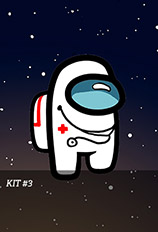
The number of SUS cases are exploding and Dr. Skeld needs you to work quickly on Phases 2 and 3 of vaccine development! Activities include helping Nurse Needle with the vaccine trials, looking at vaccination symptoms, and calculating vaccine efficacy.
- Discovery Kit #4: Vaccine distribution
-

Thank you for helping Dr. Skeld figure out which vaccines are safe enough for Polusville! We need you to help Pilot A. Bird distribute them across the town. Activities include creating a vaccine ad, map reading, and drawing.

